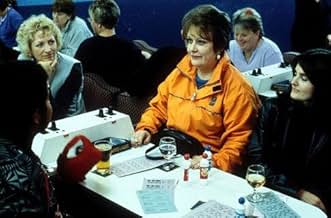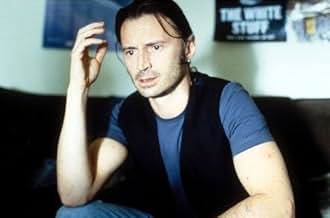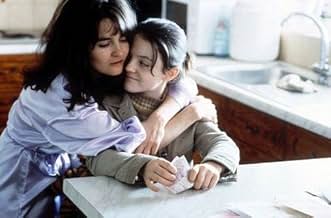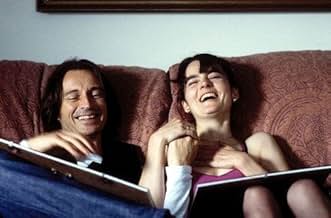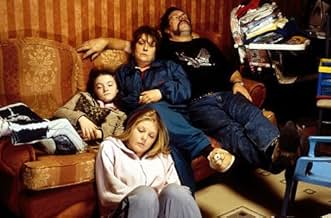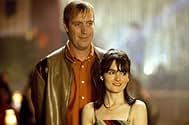IMDb RATING
6.2/10
4.9K
YOUR RATING
After seeing his ex-girlfriend (Henderson) turn down a nationally televised marriage proposal, a small-time crook (Carlyle) returns to his hometown to try and win back her heart.After seeing his ex-girlfriend (Henderson) turn down a nationally televised marriage proposal, a small-time crook (Carlyle) returns to his hometown to try and win back her heart.After seeing his ex-girlfriend (Henderson) turn down a nationally televised marriage proposal, a small-time crook (Carlyle) returns to his hometown to try and win back her heart.
- Awards
- 3 nominations total
David McKay
- Dougy
- (as David Mckay)
- Director
- Writers
- All cast & crew
- Production, box office & more at IMDbPro
6.24.8K
1
2
3
4
5
6
7
8
9
10
Featured reviews
Another role-reversal flick.
The hidden theme in this film is insipid. The daughter Marlene is the adult, while her parents, Jimmy and Shirley, are still children. Jimmy's primary school labeled him the toughest little booger in his class, and he still absurdly relishes the role. Shirley is a silly oversized thirteen-year-old who has two boys interested in her, and she flits back and forth between them as her adolescent whims take her. However, Marlene (the chronological child) is the adult who knows exactly what's best for all. Dek is also a grown-up: responsible, hard-working and kind, although naive.
Near the end Marlene wants to run away with Dek. This wasn't a bad idea. Allowing for another ten years or so for Marlene to come of age, the two of them might have been a very happy, stable couple.
Near the end Marlene wants to run away with Dek. This wasn't a bad idea. Allowing for another ten years or so for Marlene to come of age, the two of them might have been a very happy, stable couple.
Almost, but not quite as good as it should have been
When they appear on a daytime chat show, Dek surprises his girlfriend Shirley by proposing to her, only to have her say no. Shirley's ex and father of her daughter, Marlene, sees the show and leaves Glasgow with stolen money to try to reclaim her. His arrival in the one-horse town of Nottingham sparks a Western style stand off between Dek and Jimmy.
The third part in his trilogy is Meadow's most accessible film and his lightest in style. It is also likely to be FilmFour's swan-song now that it is packing up shop for good. The plot is basically a relationship drama but it is packed with enough nice touches to make it feel more than that. The mix of comedy and drama is good and the `tinned spaghetti western' feel to it manages to be clever and consistent without overpowering the film.
The story does dip in the final third however the comedy dries up and the central drama between Jimmy, Dek and Shirley comes to the fore. The other characters vanish and the subplot (Jimmy being chased by his ex-gang) just seems to stop for 30 minutes. This dip is still OK but it did feel like it had nowhere to go and was just treading water to fill out the running time.
Apart from this dip the film has much to enjoy. The comedy is good and realistic for the setting. The many characters make for a family feel rather than a simple love triangle tale and the western music and spaghetti clichés are used well without being forced down your throat. The film does also rest on several really good performances.
Ifans is absolutely great he manages to make Dek a cowardly clown but also very relateable and sympathetic. Add to this a good (if a little mousy) Henderson and a superb turn by Atkins and the main trio are brilliant. Carlyle doesn't work as well and his character is too obvious, changing when he has got his way etc, and doesn't grab attention in the way he can. Burke, Tomlinson and the various support cast are very funny but also very real. Cosmo is good and tough as always and gets plenty of surreal comedy (why do they keep stealing wholly inappropriate vehicles!?) and key a sharp eye out for a downright unusual cameo from comedy duo Vic Reeves and bob Mortimer.
Overall the parts don't all manage to come together but for the most part it is a great mix of comedy and drama carried off by some very good performances. However when the film focuses totally on the triangle at the centre it appears to run out of steam for a while and have little to do but wait for the final showdown.
The third part in his trilogy is Meadow's most accessible film and his lightest in style. It is also likely to be FilmFour's swan-song now that it is packing up shop for good. The plot is basically a relationship drama but it is packed with enough nice touches to make it feel more than that. The mix of comedy and drama is good and the `tinned spaghetti western' feel to it manages to be clever and consistent without overpowering the film.
The story does dip in the final third however the comedy dries up and the central drama between Jimmy, Dek and Shirley comes to the fore. The other characters vanish and the subplot (Jimmy being chased by his ex-gang) just seems to stop for 30 minutes. This dip is still OK but it did feel like it had nowhere to go and was just treading water to fill out the running time.
Apart from this dip the film has much to enjoy. The comedy is good and realistic for the setting. The many characters make for a family feel rather than a simple love triangle tale and the western music and spaghetti clichés are used well without being forced down your throat. The film does also rest on several really good performances.
Ifans is absolutely great he manages to make Dek a cowardly clown but also very relateable and sympathetic. Add to this a good (if a little mousy) Henderson and a superb turn by Atkins and the main trio are brilliant. Carlyle doesn't work as well and his character is too obvious, changing when he has got his way etc, and doesn't grab attention in the way he can. Burke, Tomlinson and the various support cast are very funny but also very real. Cosmo is good and tough as always and gets plenty of surreal comedy (why do they keep stealing wholly inappropriate vehicles!?) and key a sharp eye out for a downright unusual cameo from comedy duo Vic Reeves and bob Mortimer.
Overall the parts don't all manage to come together but for the most part it is a great mix of comedy and drama carried off by some very good performances. However when the film focuses totally on the triangle at the centre it appears to run out of steam for a while and have little to do but wait for the final showdown.
Engaging and funny but short on surprises.
Brilliantly observed comic scenes of working class domestic life, reminiscent of Caroline Aherne's superb 'Royle Family' sitcom, provide the backdrop for an engaging comedy-drama. All the main actors turn in typically excellent, albeit unsurprising performances: Robert Carlyle does a variation on his Scottish psycho-crim (see 'Trainspotting'), Ricky Tomlinson plays another genial but feckless Scouser (see 'The Royle Family') and Kathy Burke does her no-nonsense council-house Cockney routine (see Kathy Burke). By far the best of the ensemble is Rhys Ifans as Dek. Dek is the most rounded of the comic characters, all of whom are neatly sketched out, not just by dialogue, but by carefully chosen background details. Look out for the hub caps and model car collection in Dek's house and the cases of 'Pot Noodle' in Charlie's loo (which also serves as his office). Assured direction, a well-paced script and some very funny jokes make for a satisfying if somewhat predictable watch.
Lacks tension, suspense and a real stone wall atmosphere but it is marginally funny and somewhat appealing.
Once Upon a Time in the Midlands seems to make naming your film 'Once Upon a Time in.....' seem like a bit of a gimmick. Indeed, a year earlier Robert Rodriquez was left floundering with his over the top, epic tail of mediocrity named 'Mexico' but 'Midlands' does not make the same mistakes and nor does it ever veer too far over the line of 'big budget television drama'. However, if it doesn't veer too far over the line that's not to say it does not veer over the line at all, because it does and truth is; 'Midlands' is a pretty ordinary film.
The film can either be a big budget TV drama or a small budget film; like I said, it becomes a little too much of the former for my liking and thus fails as an engaging and intriguing tail of love, loss and family values. In fact, what it ends up as is a story that comes; sticks around and then goes again with a disappointing anticlimax and a series of scenes that remain interesting given the situation but lack any atmosphere. The story revolves around a man, named Jimmy (Carlyle), as he returns to where he once lived upon seeing a live (those things are broadcast live?) daytime chat show in order to seek out the one he loved and fathered a child with she is Shirley (Henderson). Trouble is, times have changed and she has moved on; she's with Dek (Ifans), a well respected but somewhat eccentric mechanic. The problem is with this idea, albeit a brilliant one, is that Jimmy is shown as a far too good-a person to make us want to hate him and Dek is put across as a far too funny-a person to make us want to think he is up for the challenge; thus it is no surprise when the film meanders and wonders around in a bit of a daze.
It is true to say that the opening scene focuses on Jimmy as he lies there, lost and unhappy we feel; but he is then shown to be a bit of a lad; a bit of a criminal as he and three Glaswegian thieves steal a case of money from four clowns. Even then, we can empathise with the thief in Jimmy because the heist scene is funny and why would four clowns get out of a Ford Galaxy whilst carrying a case full of money? Whatever they did, it seems they might have deserved what they got. So, so far we have spent time with Jimmy: the film could have gone down two routes: 1; make him seem evil and give him antagonistic traits meaning that when he comes for Shirley, we will be wary of him. Or 2; do not show him at all so that the impact of this rough looking guy who has shown up wanting to be together with Shirley again is a jolt to the audience and character alike 'Midlands' does neither, it makes Jimmy look like an ordinary guy, like a 'lad'; harmless yet humorous.
But what the film does isn't necessarily bad, just a little out of place. On the flip side; Dek, at least to me, came off as a bit of an eccentric and out of sorts guy who did not embody the traits required if he was going to be a hero of any sorts. Consequently, any scene in which he and Jimmy face off or are put in a location together should be filled with tension as a perhaps evil, Scottish criminal and an upstanding but strong hero come face to face what we get is a misunderstood, comic Jimmy and a wimp of a hero Dek, in an office, having an anti-climatic square off. Secondly, Jimmy really could've been established as a psycho with a few scenes in which Jimmy is perhaps stalking Shirley or drawing attention to himself through anti-social and foreboding behaviour but what we get is a couple of silly scenes at his sister's house but a good scene when she tells him what's what, however that further deflates any menace about him because there and then, the 'villain' is beaten and by his own sister, too This shows us he is vulnerable.
So onto the supporting characters; the sister is Carol (Burke) who does a lot of shouting and screaming in that annoying accent Kathy Burke carries; her husband Charlie (Tomlinson) is an introduced but underdeveloped folk singer that doesn't have much to do; the girl in question the two leads are fighting for, Shirley, is a one dimensional character who speaks as if she has something stuck in her throat and just when the film's crucible gets interesting when the Glaswegians come back for Jimmy, they disappear after one failed ambush but don't worry, they're there at the end in time for a 'funny' scene on the motorway and the running joke that they steal every car they drive feels out of place. So, Once Upon a Time in the Midlands feels anti-climatic; it feels empty in its atmosphere and development of its already familiar characters and it certainly ends in a disappointing manner leaving you with a feeling of 'So, what was all that for?' When you are supposed to feel anger, suspense, joy, fear or anything else; you'll feel nothing and that is a shame as it was a good idea, just executed a little heavy-handedly.
The film can either be a big budget TV drama or a small budget film; like I said, it becomes a little too much of the former for my liking and thus fails as an engaging and intriguing tail of love, loss and family values. In fact, what it ends up as is a story that comes; sticks around and then goes again with a disappointing anticlimax and a series of scenes that remain interesting given the situation but lack any atmosphere. The story revolves around a man, named Jimmy (Carlyle), as he returns to where he once lived upon seeing a live (those things are broadcast live?) daytime chat show in order to seek out the one he loved and fathered a child with she is Shirley (Henderson). Trouble is, times have changed and she has moved on; she's with Dek (Ifans), a well respected but somewhat eccentric mechanic. The problem is with this idea, albeit a brilliant one, is that Jimmy is shown as a far too good-a person to make us want to hate him and Dek is put across as a far too funny-a person to make us want to think he is up for the challenge; thus it is no surprise when the film meanders and wonders around in a bit of a daze.
It is true to say that the opening scene focuses on Jimmy as he lies there, lost and unhappy we feel; but he is then shown to be a bit of a lad; a bit of a criminal as he and three Glaswegian thieves steal a case of money from four clowns. Even then, we can empathise with the thief in Jimmy because the heist scene is funny and why would four clowns get out of a Ford Galaxy whilst carrying a case full of money? Whatever they did, it seems they might have deserved what they got. So, so far we have spent time with Jimmy: the film could have gone down two routes: 1; make him seem evil and give him antagonistic traits meaning that when he comes for Shirley, we will be wary of him. Or 2; do not show him at all so that the impact of this rough looking guy who has shown up wanting to be together with Shirley again is a jolt to the audience and character alike 'Midlands' does neither, it makes Jimmy look like an ordinary guy, like a 'lad'; harmless yet humorous.
But what the film does isn't necessarily bad, just a little out of place. On the flip side; Dek, at least to me, came off as a bit of an eccentric and out of sorts guy who did not embody the traits required if he was going to be a hero of any sorts. Consequently, any scene in which he and Jimmy face off or are put in a location together should be filled with tension as a perhaps evil, Scottish criminal and an upstanding but strong hero come face to face what we get is a misunderstood, comic Jimmy and a wimp of a hero Dek, in an office, having an anti-climatic square off. Secondly, Jimmy really could've been established as a psycho with a few scenes in which Jimmy is perhaps stalking Shirley or drawing attention to himself through anti-social and foreboding behaviour but what we get is a couple of silly scenes at his sister's house but a good scene when she tells him what's what, however that further deflates any menace about him because there and then, the 'villain' is beaten and by his own sister, too This shows us he is vulnerable.
So onto the supporting characters; the sister is Carol (Burke) who does a lot of shouting and screaming in that annoying accent Kathy Burke carries; her husband Charlie (Tomlinson) is an introduced but underdeveloped folk singer that doesn't have much to do; the girl in question the two leads are fighting for, Shirley, is a one dimensional character who speaks as if she has something stuck in her throat and just when the film's crucible gets interesting when the Glaswegians come back for Jimmy, they disappear after one failed ambush but don't worry, they're there at the end in time for a 'funny' scene on the motorway and the running joke that they steal every car they drive feels out of place. So, Once Upon a Time in the Midlands feels anti-climatic; it feels empty in its atmosphere and development of its already familiar characters and it certainly ends in a disappointing manner leaving you with a feeling of 'So, what was all that for?' When you are supposed to feel anger, suspense, joy, fear or anything else; you'll feel nothing and that is a shame as it was a good idea, just executed a little heavy-handedly.
Meadows' worst film.. but still better than average
Shane Meadows' first film, 'TwentyFour Seven', was dark, intense and arty; his second, 'A Room for Romeo Brass', is one my favourite movies, atmospheric, wildly funny and moving. But this, his third film, is not quite as brilliant, and indeed Meadows has acknowledged it as something of a wrong turn. Compared to it's predecessors, the mood is less claustrophobic, the humour a bit broader brush, and ultimately the movie is less poignant. Perhaps part of the problem is that whereas one of the highlights of Meadows' earlier films were the brilliant performances he coaxed out of largely unknown actors (Bob Hoskins was just about the only name of note in them), this film features a regular gallery of Brit-acting talent: Robert Carlyle, Kathy Burke, Ricky Tomslinson and Rhys Ifans. And while I have enjoyed movies featuring all of these actors, it's a bit hard, especially in the case of Tomlinson, to really see them in their roles, as opposed to as themselves. Sometimes, they almost seem to be performing too hard to fit into Meadows' sparsely filmed backdrops. One can also note that the cod-western theme is pursued with insufficient vigour to really define the movie. I don't want to be too harsh on the film overall, because there are still some very funny moments and excellent acting from Shirley Henderson and the young Finn Atkins. But it's certainly less ambitious than its two predecessors, which set the highest of standards by which to judge their successors.
Did you know
- TriviaDek (Rhys Ifans) drives a car with a vintage Welsh number plate from the late fifties, the letters of which read "DEK". It was issued in Haverfordwest, the birthplace of Rhys Ifans.
- Crazy creditsSpecial thanks to ... the People of Carlton and Gedling, Nottingham ...
- SoundtracksFeels Like I'm in Love
Written by Ray Dorset
Published by Sony/ATV Music Publishing, Ltd. / Associated Music International, Ltd.
Performed by Kelly Marie
Courtesy of Eliot Cohen (as Eliot M. Cohen) of Satellite Music, Ltd.
- How long is Once Upon a Time in the Midlands?Powered by Alexa
Details
- Release date
- Countries of origin
- Official site
- Language
- Also known as
- Érase una vez en los Midlands
- Filming locations
- Production companies
- See more company credits at IMDbPro
Box office
- Budget
- £1,950,000 (estimated)
- Gross US & Canada
- $172,564
- Opening weekend US & Canada
- $21,475
- Aug 31, 2003
- Gross worldwide
- $544,512
- Runtime
- 1h 44m(104 min)
- Color
- Sound mix
- Aspect ratio
- 2.35 : 1
Contribute to this page
Suggest an edit or add missing content







